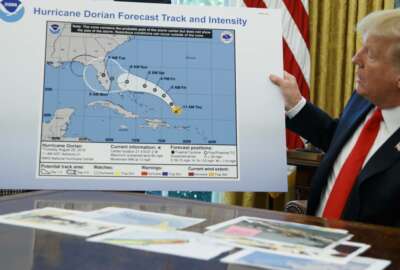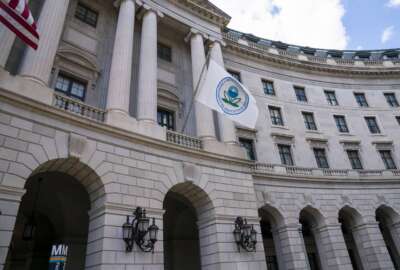Some EPA employees are happy with their new labor agreement
A new contract for employees at the Environmental Protection Agency has some new assurances that allow scientists to discuss their work more freely.
A new contract for employees at the Environmental Protection Agency has some new assurances that allow scientists to discuss their work more freely. The new contract has a provision protecting scientific integrity. For more, Federal News Network’s Eric White spoke to Jeff Ruch of the Public Employees for Environmental Responsibility (PEER) on the Federal Drive with Tom Temin.
Interview transcript:
Jeff Ruch: So this represents the first time that an external authority in this case, the Federal Labor Relations Authority, could be used to police scientific integrity requirements within a federal agency. And that’s because these provisions are now in a collective bargaining agreement that would be enforced by the FLRA. And so the idea of bringing outside entities into oversee an agency’s practices in this regard is unique. It hasn’t happened before, and also has the prospect of bringing some teeth into this area of scientific integrity. It’s often said, everyone’s entitled to their own opinion, but not their own set of facts. In federal government, the agencies are entitled to their own set of facts. And that’s what the scientific integrity policies are designed to curb. But because they’re in the hands of the agencies themselves, this self-policing has been problematic.
Eric White: I’ve seen these stories pop up over the last few years of scientists trying to discuss their work that they did while working for the agency, but not necessarily something that the agency wanted to put out in front. Is that what you mean by scientific integrity, just trying to make sure that we have the proper definition before we continue?
Jeff Ruch: Well, that’s an example of it. It’s not just only suppression of information, preventing somebody from having something published, or preventing somebody from going to a conference to discussing something. But it also includes manipulation of the basic science to reach a predetermined result. It’s sort of the whole array of basically these are kind of the reasons called integrity. It’s about making sure that the information that’s ultimately presented to the public is accurate. And the people who create those documents aren’t punished for creating documents that are inconvenient.
Eric White: And so this has been something that people in federal science agencies, or particularly scientists in federal science agencies, have been discussing for a while. Where does this achievement stand in the long run of things? Is this going to create an effect where we’re going to see more and more provisions like this in similar contracts for union and non-union employees at those other science agencies?
Jeff Ruch: Well, we would hope that it would certainly extend throughout not just EPA. So the American Federation of Government Employees, while they’re the largest, they’re not the only union. So the other union should also get these provisions as should every other union in federal service that will leave those outside of collective bargaining: managers, supervisors, confidential employees, and otherwise non-union members not covered by these provisions. But I believe that this sort of upstairs-downstairs arrangement of it takes place won’t last for a long time because it won’t be tenable. That if certain employees can go forward and discuss things, candidly, it’s going to be harder and harder for the agencies to suppress the others that are outside of the collective bargaining process.
Eric White: We’re speaking with Jeff Ruch is the Pacific Director for the Public Employees for Environmental Responsibility Organization. And so let’s get into the actual provisions that were adopted within this contract. What do they specifically call for allowing scientists to do it or the checks to the power that management has of saying what they do?
Jeff Ruch: The key provisions are that the entire scientific integrity process are going to be incorporated by reference into the collective bargaining agreement, and thus enforceable by means of complaints of unfair labor practices. And this is of significance because at EPA, their scientific integrity policy, which has been in effect for a dozen years, and they have a new revision out, doesn’t have a lot of content to it. The EPA doesn’t have any rules for how allegations of scientific misconduct are investigated, who makes judgments, what the punishment is, what are the rules for submitting studies for peer review, publication, etc, etc. This provision that says that all of these rules, once they’re developed will be subject to collective bargaining, which means that EPA can’t just impose rules. They’ll have to go to the union and negotiate rules that govern these kinds of core functions that affect pretty much everything as scientists does.
Eric White: Is this going to be enforceable by the FLRA? Because, you know, you get into the nitty gritty of these rules of, you know, who said what, who did what, first? Is this something that the FRA has experience with, in your opinion?
Jeff Ruch: Well, sort of yes and no. The no part of it is that for the most part, scientific integrity policies haven’t been enforced. And the case of EPA, there’s no enforcement mechanism, and so it’s just been kind of happy talk that’s there that isn’t subject to any enforcement. The FLRA through the current law has the ability to enforce unfair labor practices and violations of the collective bargaining agreement. And so as these provisions get more and more specific, they also get more and more enforceable. And notably, enforcement takes place outside of the confines of the agency. So the core problem with scientific integrity policies are you’re asking agencies to restrain their own discretion to control the talking points. And that’s a very difficult sort of proposition. And for the most part, the agencies put forward as EPA does high-minded rhetoric with nothing behind it. So this is the first step trying to put some concrete enforcement behind those guarantees. And the fact it’s been done external to the agency gives some prospects that it’ll be meaningful.
Eric White: PEER has former EPA and other scientists within its ranks. Have they described what exactly it means when their scientific integrity is compromised? Do you have any? You know, I don’t know if you have any specific examples or names that you want to drop or anything like that. But what are we talking about here when someone feels as if they’re not being able to speak their mind really?
Jeff Ruch: Well, we have actually an entire docket of things representing scientists. So for example, at EPA, we’re representing a group of scientists who work on approving new chemicals, who contend that their identification of risks as part of the risk assessment process in approving those chemicals has been altered or censored by their own managers to eliminate information about risks. They feel that their own work has been in essence contaminated and that they’re in some way responsible for products that are dangerous in reaching consumers and workers. And those sort of are very real concerns that cause them to lose sleep at night. And for the most part, there’s a whole set of issues that EPA has been refusing to deal with. So for the most part, some have come out. But there’s a number of Inspector General reports that are about to be issued that outline these kind of problems. And one of the limitations with Inspector General reports is that the agency can and has the option to ignore them. So the IG can issue the most scolding report in the world and EPA can say we disagree and ignore it. And so the idea of agency ordering EPA with the force of law to release something for example, one of the provisions that specifically says that if a scientist is denied the ability to attend a scientific conference in their field on government time, a denial must be put in writing with some sort of reason. And typically what happens is in cases where people are asked to do things the agency doesn’t want to do, the agency will say nothing, we’ll just sort of ignore it. In that case, they will have violated the collective bargaining agreement and be subjected to an unfair labor complaint that can be judged by this presidential-appointed Senate confirmed body that has the power under law to order EPA to follow what is agreed to in the collective bargaining. This isn’t a cake that’s completely baked. But the fact that the cake is starting to go in the oven is the stage we’re at.
Eric White: Yeah, thank you for that transition, because I was gonna say you had mentioned in one of your earlier answers, this is a first step. What is it that you all are hoping to achieve further down the road in clarifying what scientists need to do their jobs and feel dignified to their extent of what they want?
Jeff Ruch: As I said earlier, government’s entitled to their own set of facts because the scientific integrity policies are so weak. And so to the extent that there are legal protections for the accuracy of the information, as well as legal protections for the careers of the people that are speaking inconvenient truths, that’s what we’re seeking. I call it like an emerging law of science. It’s a matter of things that people discuss now for decades but we’re beginning to finally do things. Yet it’s still such an embryonic stage. It’s like a volcanic island that sort of being created. It’s not yet habitable but with each layer of material that’s put on it, it becomes more and more a livable habitat. So right now, scientists, in many cases, are most at risk because of the implications of their work can be quite explosive. But in fact, scientists have very little by way of legal protections. So typically, a scientist in these kinds of situations is not considered a whistleblower because they’re not disclosing a violation of law rule or regulation. They’re disclosing information about monk seals or about atmospheric conditions or something like that. That is a matter of fact.
Copyright © 2025 Federal News Network. All rights reserved. This website is not intended for users located within the European Economic Area.
Eric White is news anchor and Federal Drive producer at Federal News Network.
Follow @FEDERALNEWSCAST






